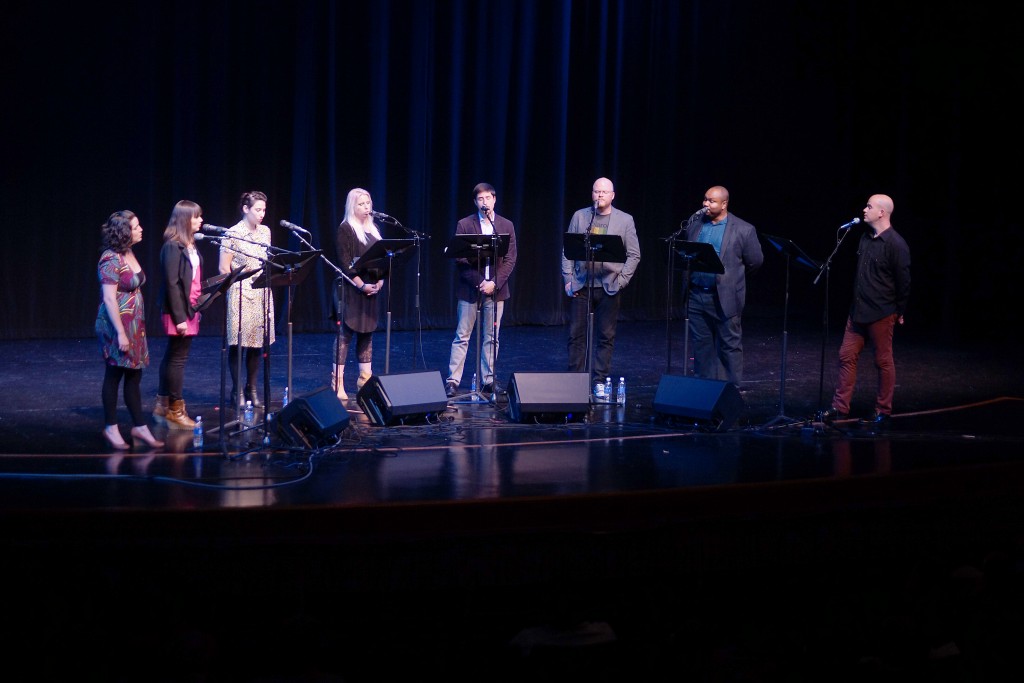
The vocal ensemble Roomful of Teeth performed on Sunday, October 11 at the Anderson Center as part of the group’s days-long stay in Binghamton. Teeth is an a cappella octet that performs songs influenced by a variety of vocal styles, including throat singing, yodeling and classical singing. While here, the group held workshops for music students and community members in composition and performance. Their performance was a part of the music department’s fall concert lineup.
Roomful of Teeth was founded in 2009 by Brad Wells and, today, their commissioned composers include Merrill Garbus of the band tUnE-yArDs. The group’s self-titled debut album won a Grammy award for Best Chamber Music/Small Ensemble Performance in 2014. Their latest album, “Render,” was released in April 2015.
The first piece performed during the Sunday afternoon concert was “Partita for 8 Voices,” composed by a cappella member Caroline Shaw, which was awarded the Pulitzer Prize for Music when it debuted. In the program for the concert, Shaw writes that, “It is with joy that this piece is meant to be received in years to come,” and the group performed it with that message in mind. The performers used intentional breathing as rhythmic devices and combined sounds not often thought of as music into a truly original piece. Vocal performances often rely on words to convey meaning, but Teeth uses the sounds we string together to make those words. This deconstruction lets the listener find their own meaning and makes the music a one-of-a-kind experience.
“They’re really unlike any group I know; they’re eight singers who pull together a really wide range of genres and styles to create something really new,” said Daniel Thomas Davis, assistant professor of music at Binghamton University.
Zachary Ritter, a junior majoring in music, was given the opportunity to have one of his original compositions read by the group. Ritter said he fell in love with the group after being encouraged to write a piece for them.
“It’s pretty exciting for me,” Ritter said. “It wasn’t just some student group on campus … Musicians of this caliber perform the piece, and it’s beautiful, and I’m so caught up in how beautiful it sounds, I can hardly think about what I want them to change to see if I can make it better.”
Roomful of Teeth is an impressive band in many ways, including the use of their upper bodies to make music. The group’s members achieve their distinct sound through a combination of throaty and deep sounds, mixed with nasally pitches and humming noises. This variety adds a richness to their performances rarely achieved by ensembles that employ instruments. The group understands that their music cannot be easily duplicated, but this is intentional. The name of the band points to its mission: to show that a roomful of teeth can make so many different sounds based on who is in the room. With a focus on education, in addition to performance, Teeth strives to create an accessible experience for every listener, from music majors to local community members.
The highlight of the concert was the performance of “Cesca’s View,” sung only by the two alto and two soprano members of the ensemble. Inspired by the daily herding of goats down the mountains of the Pyrenees, composer Rinde Eckert included yodeling in the song. The piece begins with a soprano yodeling alone, and becomes layered with the other voices yodeling beneath it. This begins a canon, or a musical repetition and layering technique to create a softer sound.
At points throughout the concert, Roomful of Teeth seemed to evoke everything from Disney princesses singing to woodland creatures to electronic dance music, all with only their eight voices. Unlike any other a cappella group out there, this performance was able to take the familiar and turn it on its head in an intriguing and impressive way.
“It’s always so inspiring to find artists who are doing these world-class pieces, and then they’ll come work with students so we can learn from them,” Ritter said. “That’s the best thing you can ask for.”


